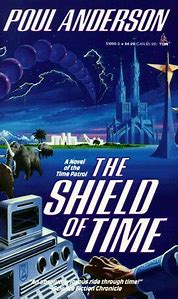"The door opened. Sunlight struck bright and bleak into the silk merchant's shop. Autumn air streamed after it, full of chill and street noises." (p. 269)
Three senses.
Through the still open door, Emil Volstrup sees cobblestones, arches, a Saracen and swallows but:
"...none of it seemed real any longer. Why should it? Whatever he saw could at any instant cease ever having been. Everything around him could. He himself." (p. 270)
It is logically possible to exist until time t1, then not exist after t1, but it is not possible to exist until t1, then, at t1, cease having existed until t1. That is contradictory.
In a sufficiently altered history, there would be no Emil Volstrup in 1137 (or whatever that year was called) but there would not be an Emil Vostrup who existed into that year, then, at some instant within it, ceased to exist - let alone ceased ever having existed.
Some passages in the Time Patrol series would have to be rewritten before I could regard them as logically coherent. However, I could not have written such a series in the first place.

1 comment:
Kaor, Paul!
But commentators, even if unable to write stories themselves, can sometimes offer useful criticism. I think you made arguments similar to what you wrote here to Anderson himself, and that he wrote to you saying he would have to keep them in made if he composed more Time Patrol stories. Alas, he never did after "Death And The Knight."
Ad astra! Sean
Post a Comment